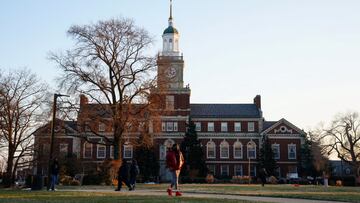How do I qualify for a private student loan?
Private student loans are a great option for some borrowers, but there are a few differences with federal options that should be known before signing.


Around 7.9 percent or $131 billion of student loan debt in the United States is held by private firms rather than the federal government.
Private student loans vary from those traditionally offered by the federal government under the Free Application for Federal Student Aid (FAFSA) Program because they are offerd by schools, banks, credit unions, and other lenders.
“Student loans were never meant to be a life sentence, but it’s certainly felt that way for borrowers locked out of debt relief they’re eligible for." https://t.co/xSa6RLN8fe
— Money (@Money) April 23, 2022
These loans are offered by private companies and typically come with a few requirements that borrowers should be aware of.
First, students must be enrolled in a qualified education of higher learning. Typically, students attending four-year colleges and universities are eligible for private loans. However, those attending community colleges or trade schools may have fewer options for private loans.
In most cases, private student loans often must be used to cover tuition and cannot be used by the borrower to cover other expenses like housing or food. In some cases, the company will pay the university directly, which means that the borrower never receives the funds directly.
When applying for a private loan, companies will often run a credit check and ask that proof of employment or income be provided. Depending on the lender, a credit score of at least 600 to 650 may be required to qualify. If unable to meet the financial or employment requirements, the company may require a co-signer to take on the loan with the student. This information is not typically necessary when applying for a federal student loan which may make them a better option for some.
Be aware of high-interest rates
While some borrowers may be able to access private loans at lower interest rates than those offered by the federal government, this is not always the case. Federal loans, by law, much have a such as fixed interest rates and income-driven repayment plans. A variable interest rate could allow the rate to increase over the life of the loan. Borrowers should be aware of this before signing any contracts, as many graduates suffer to pay back their loans promptly because of high interest. However, like federal loans, the interest is tax-deductible.
Private loans may also require students to begin making payments on the loan before they graduate.
When will the student loan moratorium expire?
President Biden has announced another extension to the student loan moratorium through 30 August.
Related stories
This comes as pressure mounts from his own party to cancel student loans. On the campaign trail, then-candidate Biden had promised to cancel anywhere between $10,000 and $50,000 worth of debt for each borrower.
@NewYorkFed has some projections on student loan debt cancellation today: They posit means tested student debt cancellation would better target borrowers who have struggled or would struggle. They measured the effect of a $75k income cap on both $10k & $50k cancellation.
— Anna Helhoski (@AnnaHelhoski) April 21, 2022
Since taking office, the White House has made it clear that if Congress passes a bill to cancel student debt held by the federal government, President Biden would be willing to sign the bill. However, he is unwilling to take executive action on the matter at this point.

